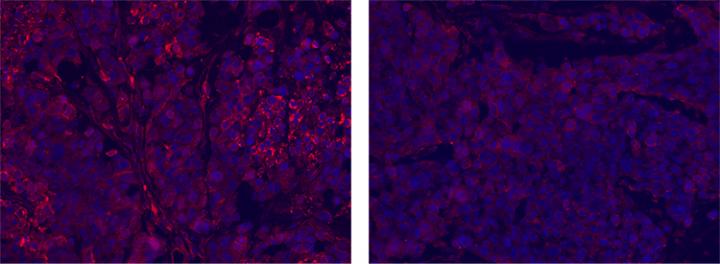Researchers from UNIGE and UNIL demonstrate the efficacy of a well-known antibiotic in treating a particularly fatal form of breast cancer, offering hope for targeted therapy

Credit: (©UNIGE – UNIL – Vladimir Katanaev)
Of the three major subtypes of breast cancer, the «triple negative» is the most lethal: half of all breast cancer deaths are attributed to it, whereas it accounts for only about 15% of incidences of breast cancer. And unlike other breast cancers, it is resistant to most existing therapies. By studying the properties of clofazimine, a 70-year-old antibiotic, scientists from the Universities of Geneva (UNIGE) and Lausanne (UNIL), in Switzerland, demonstrate its effectiveness in stopping the progression of the disease in in vivo tests. Indeed, it blocks the Wnt cell signalling pathway – a disruption of the cell mechanism that causes many cancers, including triple negative breast cancer. These results, to be read in Cancer Letters, highlight the need to re-examine with a fresh eye the drugs already on the market, especially the older ones.
Triple negative breast cancer is a particularly aggressive form of breast cancer, affecting especially young women. Its very rapid progression and the lack of effective treatment thus contribute to making it an extremely serious disease, causing the death of more than 200,000 women worldwide each year.
Better targeting for better care
Increasingly, cancer specialists are seeking to develop therapies that specifically target cancer cells but that would spare healthy cells. Vladimir Katanaev, Professor at the Faculty of Medicine Translational Research Centre in Oncohaematology (CRTOH) of the UNIGE, who directed this work, explains the principle behind it: “The idea is to identify molecular elements specific to tumour cells, but absent from healthy cells, and precisely target them. These elements – called oncogenes – are necessary to transform healthy cells into malignant cells, so it is important to bring them down without damaging neighbouring cells.”
In the case of triple negative breast cancer, as well as in other cancers such as liver or colon cancer, one of the main suspects is the Wnt signalling pathway. When cells communicate with each other, they do so through chemical signals, i.e. the signalling pathways. The cell that receives the signal responds to it by migrating, for example, or by dividing. The Wnt signalling pathway is essential during embryogenesis by allowing the unborn baby to develop properly. In adults, however, it usually shuts down and its reactivation – following a mutation or epigenetic modification – gives an erroneous growth signal and allows tumour development. However, if Wnt is blocked, tumour growth stops.
A very old antibiotic with unsuspected capacities
In 2014, Professor Katanaev’s team (at UNIL back then) had shown in vitro the inhibitory effect of clofazimine on the Wnt signalling pathway in triple negative breast cancer. They now confirm this effect in vivo, in animal models of the disease: “With clofazimine, tumour growth is significantly reduced”, says Vladimir Katanaev. “In addition, we did not detect any adverse side effects, an essential aspect of drug development process.”
The researchers also demonstrated that clofazimine targets the Wnt signaling pathway well in vivo, as expected. In addition, clofazimine is even more effective when administered in combination with doxorubicin, a conventional chemotherapeutic drug. Alexey Koval, a researcher at the CRTOH of the UNIGE at the Faculty of Biology and Medicine of the UNIL and co-first author of this study, analyses these results: “Clofazimine acts as an inhibitor of the Wnt signaling pathway: the sick cell can no longer divide, but does not die. Doxorubicin, on the other hand, kills cells that have stopped growing. A combination of great efficacy!”
Is drug repositioning the future of pharmacology?
Many researchers around the world have undertaken to review existing drugs in the light of new technologies and methodologies now available, in order to discover unknown effects. The repositioning of drugs, for which testing and marketing procedures are simpler than for entirely new molecules, saves time and costs less. Clofazimine, an antibacterial agent used to fight leprosy, has been on the market for a long time and is, in fact, in the public domain. “This very inexpensive drug is even on the WHO’s list of essential medicines and is produced all over the world, including in Switzerland,” adds Vladimir Katanaev. “This is an advantage, of course, but it also complicates the fundraising required to continue our work: indeed, no patent can be filed.”
The next step is now to conduct clinical trials involving volunteer patients, first in Geneva, then likely elsewhere in Switzerland.
###
Media Contact
Vladimir Katanaev
[email protected]
Original Source
https:/
Related Journal Article
http://dx.




